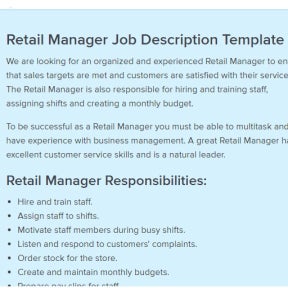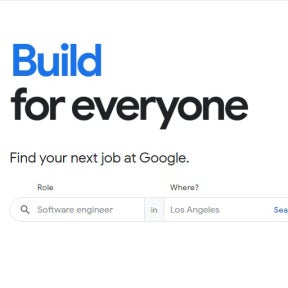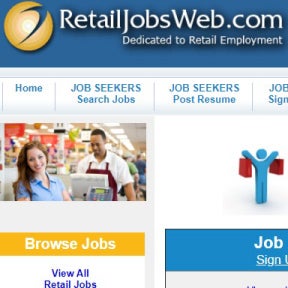How to Find a Retail Manager:

A step-by-step guide to hiring top-quality retail managers for your retail company. Includes a full hiring process that will help you find and hire the best retail managers fast.
Attract the best retail managers.
Craft an appealing job description.

An attractive job post needs to clearly define the responsibilities of the role, and advertise any benefits that the successful candidate will receive. To find a good retail manager, you should also make it clear which skills and experience the ideal candidate should have.
Candidates applying for a management-level position take a keen interest in the company culture when choosing a new job. Therefore you will recruit retail managers more effectively by describing this aspect of your company.
Emphasize the soft skills required for the role in your job post. While skills like data analysis are important, they can often be learned over time. Communication skills and the ability to problem-solve are incredibly important when you source retail managers.
Experience in retail is not necessarily the best reflection of a candidate's ability to manage a team. Prioritize good leadership skills when hiring retail managers.
Use a retail manager job description template to make it easier.

A retail manager job description template will provide much of the boilerplate information you'll need, such as responsibilities and qualifications, making your task a bit easier.
Advertise the position.
Post your job to general sites, such as Indeed.

Start by posting to general job posting sites such as Indeed. These are great places to start because they get plenty of traffic and they're free.
Make sure your job is picked up by Google.

Google for Jobs allows your posting to be seen in search results. This can greatly increase your job visibility. You can get it picked up by Google by having someone properly format it on your website, or by using a service (such as Betterteam) that creates a properly formatted jobs page for you automatically.
Target job boards dedicated to the retail industry.

This will narrow your search to managers who have experience in the retail industry. Use a retail industry job posting site to advertise vacancies.
Ask employees for referrals.

A great way to find and hire a qualified retail manager is to ask current employees for referrals. Create an employee referral program to motivate employees to participate in the recruiting process. Essentially, the program offers rewards for any referrals leading to hires. Make sure it is clear to your employees that the retail managers they refer should have the right skills, qualifications, work ethic, and attitude.
Vet your candidates.
Screen your applicants.

As applications come through, you should filter the list by asking a few screening questions via email. These questions should reveal if the candidate meets your basic requirements, such as some training in management and a salary expectation that matches what you are offering.
Example questions:
- What are your salary expectations?
- What training have you received in management or leadership?
- Which businesses have you managed previously? Alternatively, have you managed a team within a business before?
- Are you able to work overtime when needed?
If you've received a large number of applications, consider using applicant tracking systems (ATS) to filter out the best resumes and send your screening questions to these candidates.
Conduct background checks.

Once you've narrowed your candidate pool, you'll need to conduct background checks to verify their employment history, application details, criminal record, and more. Read our guide to the best background checking services for new hires.
Conduct interviews and trials.
Conduct a phone interview.

Following your screening questions, you should set up a phone interview with candidates who meet your requirements. Finding retail managers that match your company culture and who have a good reason for wanting to join your company can be made easier by asking in-depth questions in a phone interview.
Example questions:
- Why do you want to work for this company?
- Why are you interested in management?
- How do you set sales goals?
- How do you ensure that sales goals are met?
- Have you had to resolve conflict in the workplace before? Can you describe the situation and how you handled it?
- Have you ever failed to meet goals? Why do you think this happened?
- How would you describe the ideal corporate structure?
Have the answers to the candidate's screening questions at hand during the phone interview, and look for any inconsistencies. If the candidate has changed their answers completely, this is a red flag.
Do a trial workday.

Invite promising candidates to your store for a trial workday or shift to see how they perform. Look out for how well they adapt, as well as the chemistry they have with your staff.
Take a moment to show them your software and see how familiar they are with the way you monitor inventory or do payroll. While this is not preclusive, it can show which candidates will be more comfortable transitioning to your company.
At the end of the trial workday, get feedback from existing staff. This may help you to gauge how well the new manager complements the team.
Conduct an in-person interview.

After the trial workday, you should have a short interview with the candidate to clarify any information you still need from them. This is also a chance to observe how they present themselves and how well they can communicate their thoughts.
If you are serious about a candidate, you should allow them to ask questions about the role and/or the company and highlight aspects of the role that they have mentioned an interest in.
You can refer to our retail manager interview questions for question ideas and what to look for in the candidate's answers.
Hire your new retail manager.
Make an offer.

By this stage, you should have a clear idea of which candidate you would like to hire. Phone the candidate to let them know that they have been successful, and then send an email with a formal job offer. Your email should also include the job description, salary amount, additional benefits, and start date.
Use our job offer letter template to craft a compelling and professional letter.
Onboard your new manager.

Onboarding is a key final step in the hiring process that is not to be overlooked. Make a good first impression and get the new hire up and running fast by having a detailed and organized onboarding process.


